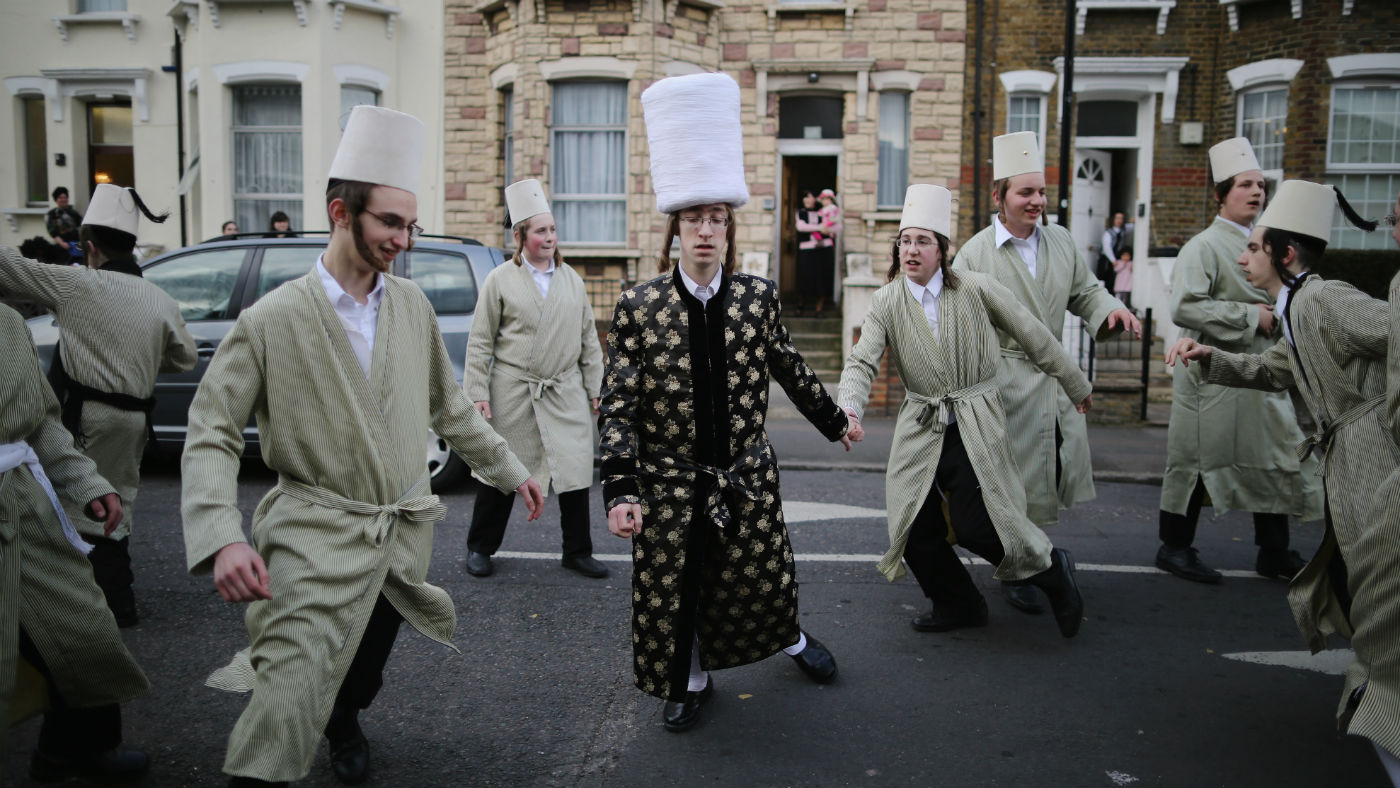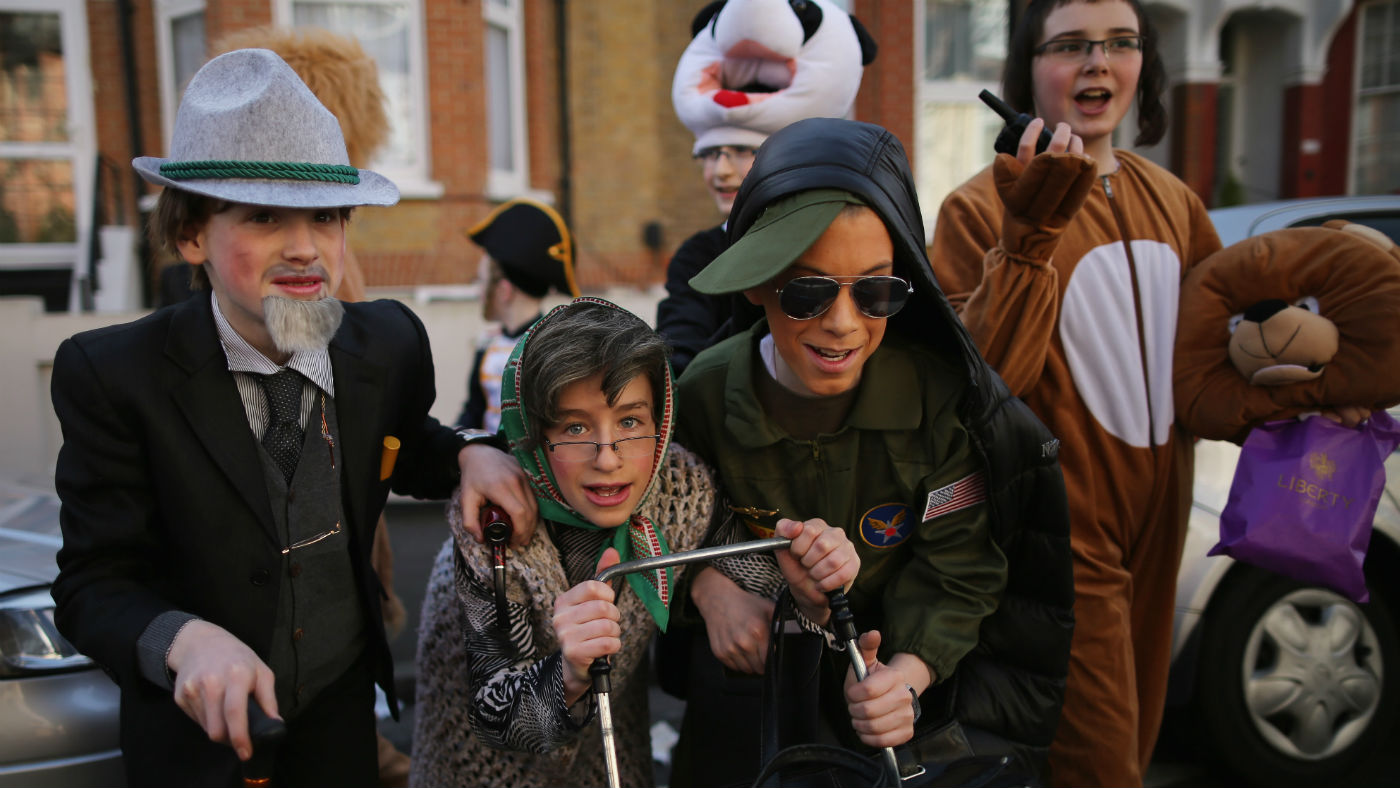Purim 2020: what is the Jewish holiday and how is it celebrated?
Joyous, boozy festival has been dubbed the ‘Jewish Mardi Gras’

A free daily email with the biggest news stories of the day – and the best features from TheWeek.com
You are now subscribed
Your newsletter sign-up was successful
Jewish communities are celebrating Purim this week.
The festival allows even the most buttoned-down orthodox sects to let loose for a day of costumes and carousing, fuelled by religiously mandated alcohol.
Here is what it is all about:
The Week
Escape your echo chamber. Get the facts behind the news, plus analysis from multiple perspectives.

Sign up for The Week's Free Newsletters
From our morning news briefing to a weekly Good News Newsletter, get the best of The Week delivered directly to your inbox.
From our morning news briefing to a weekly Good News Newsletter, get the best of The Week delivered directly to your inbox.
When is Purim?
Purim falls on Monday 9 March in 2020, and continues through to Tuesday 10 March. Metro notes that, as with the majority of Jewish holidays, Purim begins in the UK at sundown, in keeping with the Hebrew calendar (in which days technically begin at sundown).
What does Purim celebrate?
The festival honours the Jewish heroine Esther, whose story appears in the Torah and Old Testament, according to the Jewish Woman’s Archive.
A free daily email with the biggest news stories of the day – and the best features from TheWeek.com
The tale takes place in Ancient Persia, where King Ahasuerus is enamoured of Esther, a beautiful and virtuous orphan raised by her cousin Mordecai. Unaware that she is Jewish, Ahasuerus marries Esther. Offended by Mordecai’s refusal to bow before him, the king’s vizier, Haman, then discovers the family’s origins and plots to exterminate all of the kingdom’s Jews.
Purim takes its name from the lots (“purim” in Hebrew) that Haman casts to choose the 13th day of the Jewish calendar month of Adar as the date for the massacre.
Mordecai discovers the plot and, at his urging, Esther risks her life by revealing her identity to Ahasuerus and exposing Haman’s plot to wipe out her people. Ahasuerus orders Haman to be hanged, and the Jews attack and kill the enemies preparing to slaughter them.
Purim is celebrated on the 14th day of Adar, when the Persian Jews are said to have celebrated after vanquishing their would-be executors.
As The Algemeiner interprets it: “Whether you believe it actually happened or not, the message of Purim is that people screw up, and life is unpredictable. It can be horrible. Even if we put our trust in God, who is not mentioned in the text, but works behind the scenes, we still have to do our part.”
Unusually, in certain ancient walled cities (Jerusalem being the primary example) Purim is observed not on the 14th of Adar but on the 15th. Chabad.org reports that this is “to commemorate the fact that in the ancient walled city of Shushan, where the battles between the Jews and their enemies extended for an additional day, the original Purim celebration was held on the 15th of Adar”.
The 15th of Adar is thus called “Shushan Purim,” and is a day of joy and celebration also in those places where it is not observed as the actual Purim.
How is Purim celebrated?
In keeping with the festival’s spirit of rescue, Purim is “one of the most joyous and fun holidays on the Jewish calendar”, says online encyclopaedia Judaism 101.

A group of Orthodox Jewish men and boys dance in the street in London during Purim 2015 (Dan Kitwood/Getty Images)
Purim is often marked with parades and fancy dress, a custom that 13th century Italian Jews are thought to have adopted from the pre-Lent masquerades held by their Christian neighbours, Haaretz reports.
The carnival-like atmosphere has led Americans to sometimes refer to Purim as the “Jewish Mardi Gras”, says the BBC.

Children in costume in London during Purim 2015 (Dan Kitwood/Getty Images)
There are four main religious requirements for observant Jews on Purim. Most importantly, they must attend the synagogue on the eve of Purim or the following day, when the story of Esther is read aloud.
Whenever Haman’s name is mentioned, the congregation will drown it out by hissing, stamping their feet or shaking special rattles (called graggers).
The second and third obligations command the faithful to mark the occasion by sending food to one another - in the modern era, often in the form of a gift basket - and giving to the poor.
The final requirement is to attend a festive meal. These feasts are best known for the amount of alcohol consumed.
Religious authorities are “unanimous” that “it is a mitzvah [commandment] to drink, and drink to excess, on Purim”, says Jewish website Chabad.

The festivies prove too much for at least one ultra-Orthodox reveller during Purim celebrations in 2017 (Ilia Yefimovich/Getty Images)
Exactly how drunk one should aim to get has been a matter of rabbinical debate for centuries, although 4th century rabbi Rava held that one should drink “until he does not know the difference between ‘cursed be Haman’ and ‘blessed be Mordechai’”.
Luckily, Purim has a traditional food to help revellers soak up all the booze - triangle-shaped filled biscuits or pastries called hamentaschen (Yiddish for “Haman pockets”).
-
 Is Andrew’s arrest the end for the monarchy?
Is Andrew’s arrest the end for the monarchy?Today's Big Question The King has distanced the Royal Family from his disgraced brother but a ‘fit of revolutionary disgust’ could still wipe them out
-
 Quiz of The Week: 14 – 20 February
Quiz of The Week: 14 – 20 FebruaryQuiz Have you been paying attention to The Week’s news?
-
 The Week Unwrapped: Do the Freemasons have too much sway in the police force?
The Week Unwrapped: Do the Freemasons have too much sway in the police force?Podcast Plus, what does the growing popularity of prediction markets mean for the future? And why are UK film and TV workers struggling?
-
 Epstein files topple law CEO, roil UK government
Epstein files topple law CEO, roil UK governmentSpeed Read Peter Mandelson, Britain’s former ambassador to the US, is caught up in the scandal
-
 Iran and US prepare to meet after skirmishes
Iran and US prepare to meet after skirmishesSpeed Read The incident comes amid heightened tensions in the Middle East
-
 Israel retrieves final hostage’s body from Gaza
Israel retrieves final hostage’s body from GazaSpeed Read The 24-year-old police officer was killed during the initial Hamas attack
-
 China’s Xi targets top general in growing purge
China’s Xi targets top general in growing purgeSpeed Read Zhang Youxia is being investigated over ‘grave violations’ of the law
-
 Panama and Canada are negotiating over a crucial copper mine
Panama and Canada are negotiating over a crucial copper mineIn the Spotlight Panama is set to make a final decision on the mine this summer
-
 Why Greenland’s natural resources are nearly impossible to mine
Why Greenland’s natural resources are nearly impossible to mineThe Explainer The country’s natural landscape makes the task extremely difficult
-
 Iran cuts internet as protests escalate
Iran cuts internet as protests escalateSpeed Reada Government buildings across the country have been set on fire
-
 US nabs ‘shadow’ tanker claimed by Russia
US nabs ‘shadow’ tanker claimed by RussiaSpeed Read The ship was one of two vessels seized by the US military